CALLAN UNCOVERED
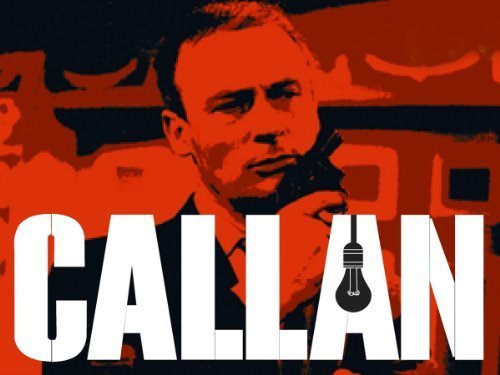 CALLAN UNCOVERED In the 1967 British television drama A Magnum for Schneider, the terse talking, totally ruthless secret agent David Callan became an instant touchstone of British spy fiction. A hugely successful television series quickly followed—running from 1967 to 1972—along with films, five novels and at least forty short stories syndicated in newspapers around the world.
CALLAN UNCOVERED In the 1967 British television drama A Magnum for Schneider, the terse talking, totally ruthless secret agent David Callan became an instant touchstone of British spy fiction. A hugely successful television series quickly followed—running from 1967 to 1972—along with films, five novels and at least forty short stories syndicated in newspapers around the world.
 For those unfamiliar with the TV series or books, Callan is a spy and assassin working for The Section, a very covert branch of the British Secret Service. Similar to the real life MI5, The Section is responsible for handling internal threats to the United Kingdom. Unlike MI5, The Section has carte blanche to use the most ruthless of methods.
For those unfamiliar with the TV series or books, Callan is a spy and assassin working for The Section, a very covert branch of the British Secret Service. Similar to the real life MI5, The Section is responsible for handling internal threats to the United Kingdom. Unlike MI5, The Section has carte blanche to use the most ruthless of methods.
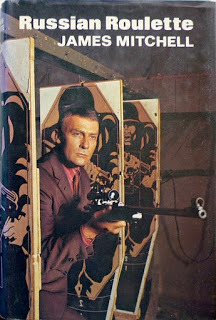 Created by author James Mitchell, and portrayed with callous world-weariness by actor Edward Woodward, Callan is the anti-Bond—a man doing a blue collar job he often regrets, but keeps doing because he knows nothing else. Executioner, bodyguard, stone killer, Callan is a blunt instrument wielded by Hunter—the codename for his eventually despised agency control—constantly at odds with Meres—The Section’s other top agent—and aided by his one friend, the malodourous ex-con and petty thief known as Lonely. Hidden behind the façade of a scrap metal business, The Section’s penchant for interrogation by torture is well known to enemies of the Crown (in one episode, a KGB agent pleads with Callen to kill him rather than turn him over to the torturers), and extrajudicial killings are so routine they have a color-coded filing system. Disillusioned and cynical, Callan is aware he is too good at his job, and knows too much, to be allowed to quit. Paranoid in the extreme, Callan revels in being insubordinate, anti-authoritarian, difficult, and constantly at odds with those attempting to control him. Yet, despite being a volatile, remorselessly efficient killer, quick to use violence as a first resort, Callan is sympathetic when compared to his sadistic upper class superiors and colleagues. As the series progresses, Callan struggles against blindly following orders—often at a high personal price. It is this conflict, combined with the stark portrayal of the dirty world of espionage, which make Callan an icon of the genre.
Created by author James Mitchell, and portrayed with callous world-weariness by actor Edward Woodward, Callan is the anti-Bond—a man doing a blue collar job he often regrets, but keeps doing because he knows nothing else. Executioner, bodyguard, stone killer, Callan is a blunt instrument wielded by Hunter—the codename for his eventually despised agency control—constantly at odds with Meres—The Section’s other top agent—and aided by his one friend, the malodourous ex-con and petty thief known as Lonely. Hidden behind the façade of a scrap metal business, The Section’s penchant for interrogation by torture is well known to enemies of the Crown (in one episode, a KGB agent pleads with Callen to kill him rather than turn him over to the torturers), and extrajudicial killings are so routine they have a color-coded filing system. Disillusioned and cynical, Callan is aware he is too good at his job, and knows too much, to be allowed to quit. Paranoid in the extreme, Callan revels in being insubordinate, anti-authoritarian, difficult, and constantly at odds with those attempting to control him. Yet, despite being a volatile, remorselessly efficient killer, quick to use violence as a first resort, Callan is sympathetic when compared to his sadistic upper class superiors and colleagues. As the series progresses, Callan struggles against blindly following orders—often at a high personal price. It is this conflict, combined with the stark portrayal of the dirty world of espionage, which make Callan an icon of the genre.
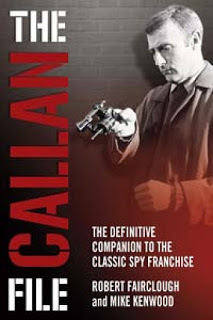 As companion pieces to the television series, Mitchell wrote five Callan novels: A Magnum for Schneider, Russian Roulette, Death and Bright Water, Smear Job, and Bonfire Night. Mitchell was also prolific enough to write weekly short stories—featuring Callan, Lonely, and the other regular members of the Section—for Britain’s Sunday Express and syndication in newspapers in Singapore and Australia. A Sunday Express advertisement heralding the start of the Callan stories publication clearly describes Callan’s world…
As companion pieces to the television series, Mitchell wrote five Callan novels: A Magnum for Schneider, Russian Roulette, Death and Bright Water, Smear Job, and Bonfire Night. Mitchell was also prolific enough to write weekly short stories—featuring Callan, Lonely, and the other regular members of the Section—for Britain’s Sunday Express and syndication in newspapers in Singapore and Australia. A Sunday Express advertisement heralding the start of the Callan stories publication clearly describes Callan’s world…
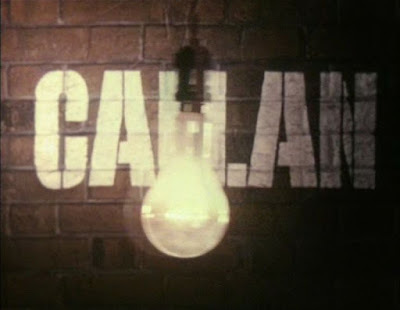 CALLAN BLASTS IN…
Three years ago a cold, hard, enigmatic character in a rumpled raincoat made his first appearance on Britain’s television screens. He was a special agent. He could if necessary be a killer. He had no pretty girls to decorate his activities. He did not go on his assignments in fast, expensive cars. He had no gimmicks. But he had authority and credibility. He quickly shot up in the viewing charts – and stayed there. His name is Callan. Like the Callan stories which have gripped television viewers, the Callan adventures written for the Sunday Express are packed with action and suspense—with many an unexpected twist at the end. A must for all who enjoy tensely, tersely told stories of suspense and mystery.
CALLAN BLASTS IN…
Three years ago a cold, hard, enigmatic character in a rumpled raincoat made his first appearance on Britain’s television screens. He was a special agent. He could if necessary be a killer. He had no pretty girls to decorate his activities. He did not go on his assignments in fast, expensive cars. He had no gimmicks. But he had authority and credibility. He quickly shot up in the viewing charts – and stayed there. His name is Callan. Like the Callan stories which have gripped television viewers, the Callan adventures written for the Sunday Express are packed with action and suspense—with many an unexpected twist at the end. A must for all who enjoy tensely, tersely told stories of suspense and mystery.
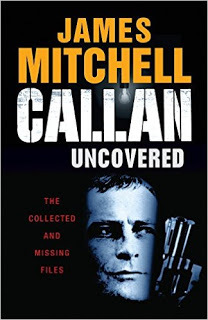 In 2014, editor Mike Ripley gathered over twenty of these never before collected short Callan stories, which were published over forty years earlier. With these in hand, along with an early treatment for an episode of Callan the television series, the screenplay for an un-filmed episode, and an introduction by Peter Mitchell (James Mitchell’s son), Ripley published the collection under the title, Callan Uncovered as an unexpected prize for Callan fans.
In 2014, editor Mike Ripley gathered over twenty of these never before collected short Callan stories, which were published over forty years earlier. With these in hand, along with an early treatment for an episode of Callan the television series, the screenplay for an un-filmed episode, and an introduction by Peter Mitchell (James Mitchell’s son), Ripley published the collection under the title, Callan Uncovered as an unexpected prize for Callan fans.
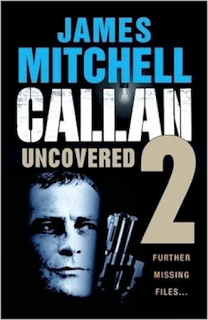 Believing there were still more forgotten Callan stories, Ripley and several other dedicated Callan fans continued sifting through microfilm and moldering newsprint. Eventually, they uncovered twenty further short stories. They were also able to reconstruct two of James Mitchell’s scripts for early Callan television episodes (1967’s, Goodness Burns Too Bright, and 1969’s, Blackmailers Should Be Discouraged), for which no known recordings exist. All of this invariably led to the publication of Callan Uncovered 2, continuing the chronicling of the Callan short stories from the Sunday Express. Despite the concurrent pressure of a writing weekly scripts for the Callan television series, Mitchell was amazingly able to avoid being formulaic in the short stories, yet still delivered emotional punches each week every bit as bleak and brutal as the TV episodes.
Believing there were still more forgotten Callan stories, Ripley and several other dedicated Callan fans continued sifting through microfilm and moldering newsprint. Eventually, they uncovered twenty further short stories. They were also able to reconstruct two of James Mitchell’s scripts for early Callan television episodes (1967’s, Goodness Burns Too Bright, and 1969’s, Blackmailers Should Be Discouraged), for which no known recordings exist. All of this invariably led to the publication of Callan Uncovered 2, continuing the chronicling of the Callan short stories from the Sunday Express. Despite the concurrent pressure of a writing weekly scripts for the Callan television series, Mitchell was amazingly able to avoid being formulaic in the short stories, yet still delivered emotional punches each week every bit as bleak and brutal as the TV episodes.
 Always authentic, the stories were rarely longer than 3,500 words, but with their plot reversals, cynical double-dealing and sardonic, hardboiled dialogue, they are tight nuggets of reading gold. I had a great time with both of these collections and recommend them highly for both long time Callan devotes and new comers alike. British espionage fiction at its most clinical and brutal. FOR EDITOR MIKE RIPLEY’S ESSAY ON COLLECTING THE CALLAN SHORT STORIES CLICK HERE FOR FURTHER ON CALLEN UNCOVERED AND CALLAN UNCOVERED 2 CLICK HERE
Always authentic, the stories were rarely longer than 3,500 words, but with their plot reversals, cynical double-dealing and sardonic, hardboiled dialogue, they are tight nuggets of reading gold. I had a great time with both of these collections and recommend them highly for both long time Callan devotes and new comers alike. British espionage fiction at its most clinical and brutal. FOR EDITOR MIKE RIPLEY’S ESSAY ON COLLECTING THE CALLAN SHORT STORIES CLICK HERE FOR FURTHER ON CALLEN UNCOVERED AND CALLAN UNCOVERED 2 CLICK HERE
Published on April 06, 2016 10:22
No comments have been added yet.



